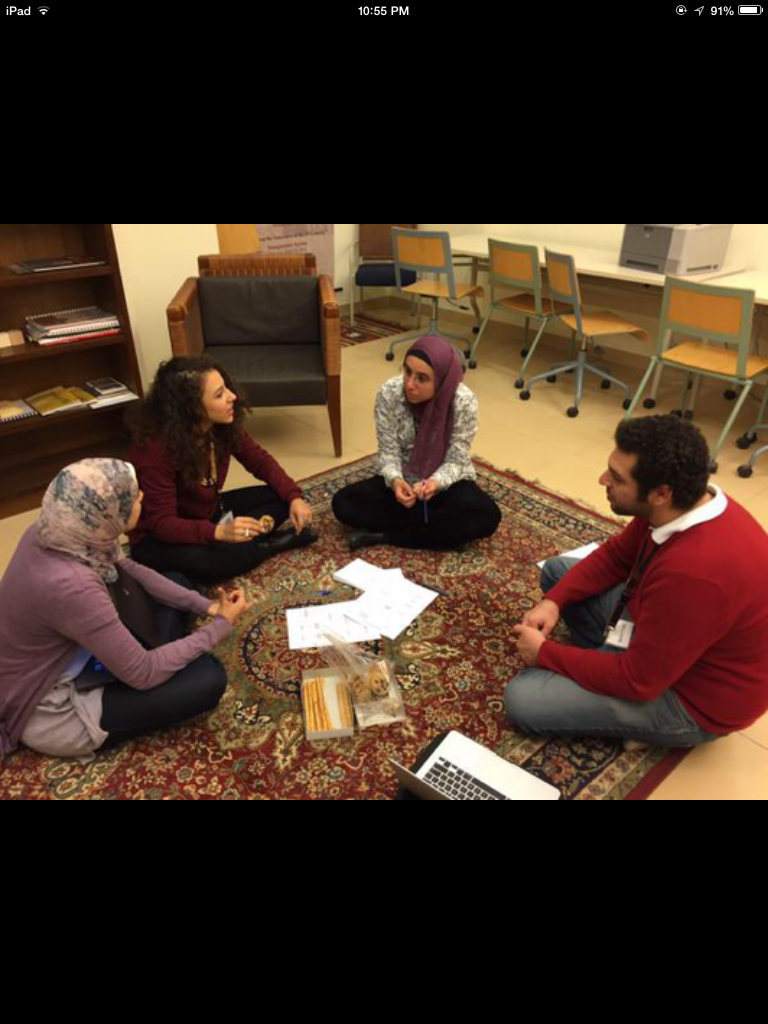Estimated reading time: 2 minutes, 54 seconds
Today we had the most fun half-day meeting at our department. We were sitting to design a faculty development game (Nadine and Sherif’s idea, inspired by Ana Salter’s workshop) to use while consulting with faculty to understand their needs and tech readiness – it is a scaffold instead of a survey, kind of. This is so cool and I wanted to share.
For now, I want to focus on a few interesting things
A. Team-building
There are a core group of us who work on blended learning, who intersect with another group who do edu games – and even though the main two people working on this game throughout the day were people who did both (Sherif and me), almost everyone from the department contributed at one point or another. It was fun and we laughed like crazy. We also went kind of crazy shifting ideas and trying to see what might work and coming across stumbling blocks. We look forward to Ana Salter’s feedback on our idea tomorrow inshallah
B. Why Gamify?
I say a lot that i like edu games but not gamification. The main idea we are building the game on is already a flowchart I co-developed w my colleagues Gihan & Nadine. We kept coming across stumbling blocks of what value added is the game, where is the fun in doing it?
For me, and for some of us, it seemed like the game was just a way for US TO HAVE FUN during the consultation! Lol
But no, really, one reason is we want faculty to come out of the game with several possible “winning” states, not all of them necessarily the ones they thought they wanted coming in. This means that we needed the game not to look linear, as if not going the straight line means they somehow lost. So we thought of making it a board game with a center and movement in diff directions. We thought of how to remove negative connotations of movements so instead of +/- or up/down or forward/back (all w connotations) our colleague Fady (ed game design expert by now!) suggested North/South and East/West (ok, i joked that this one has political connotations haha but in this context is a great neutral approach)
C. Unexpected Outcomes
Aside from the team spirit, what I loved was that it made us really all THINK about why we were doing this, what we wanted faculty to get out of it, how we wanted them to FEEL. And also how our questions might put them down or make them feel bad, etc. We had to ask what we really needed to know, and how much we wanted faculty to realize it. We decided against using points because they might make faculty feel judged. We shifted among many different options but i think we are close to something workable.
An unexpected outcome of this game is that we all reflected collaboratively on what we do and we also now all understand it better – and it is now a shared understanding (any of us can now give this consultation on their own) that we socially constructed… Oh, this is beyond social constructivism, it’s constructionism.
Oh my God, Papert is right – we learn so much from MAKING and oh my God, this is connected learning. Offline. Well, we did tweet a bit in between.
Looking forward to seeing how this game evolves… And testing it out next week! Inshallah


Maha- can you share the game? I’m working on faculty development in bleended learning right now and am even c0-planning a workshop. Would love to hear what you’ve come up with!
Hi Betty, I will when we are done. Basically, it’s a board where u start in the middle of a circle and u move in 4 possible directions (north/south/east/west) according to answers to questions that check ur tech readiness (e.g. Taught online before, used LMS, use social media) and justification for blending (well thought out, will expand access, etc; departmental direction, etc.). It is based on a flowchart we had made + ideas of needs assessment as done by Penn State as well. Sort of 🙂
I’ll look for a link to the flowchart for u
https://docs.google.com/a/aucegypt.edu/file/d/0B8ZWWX3V4nbHaG50QzZ0RExkWUU/edit?usp=docslist_apiDoes this link work?